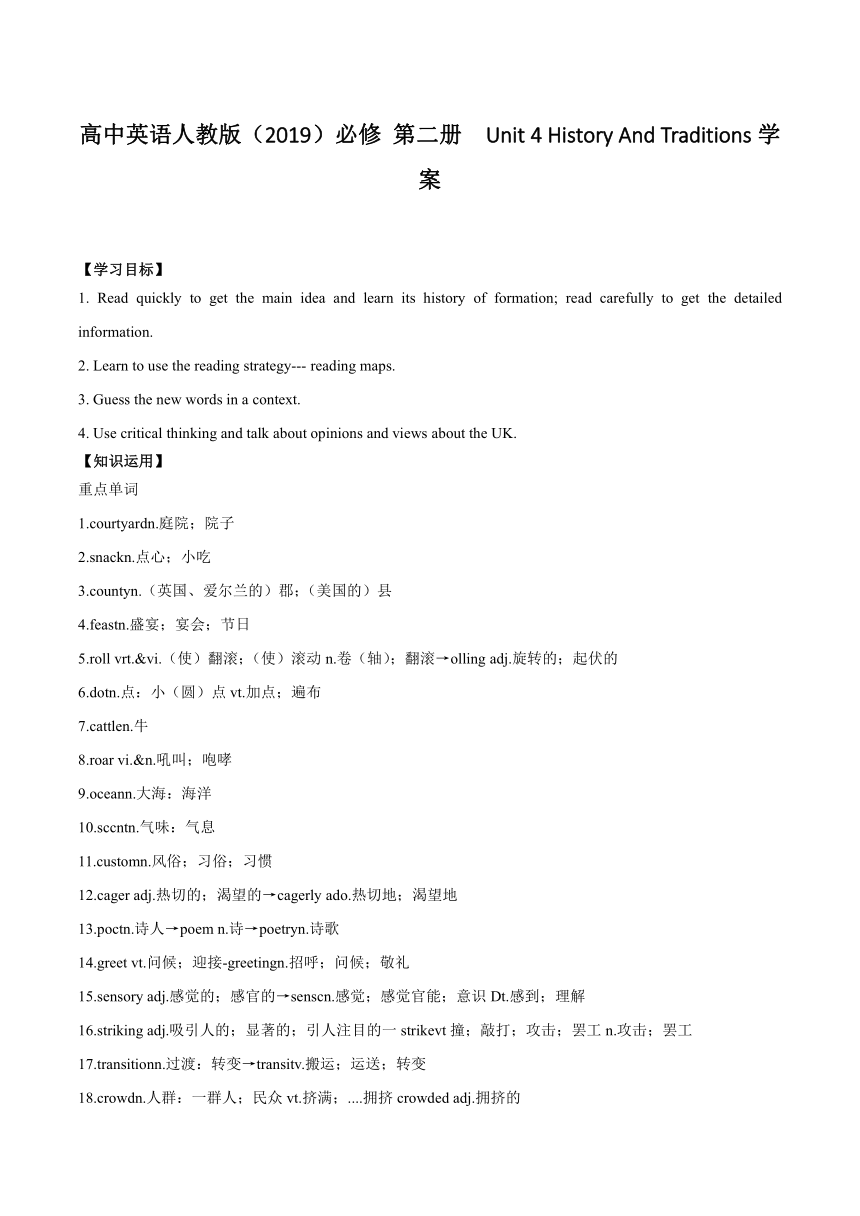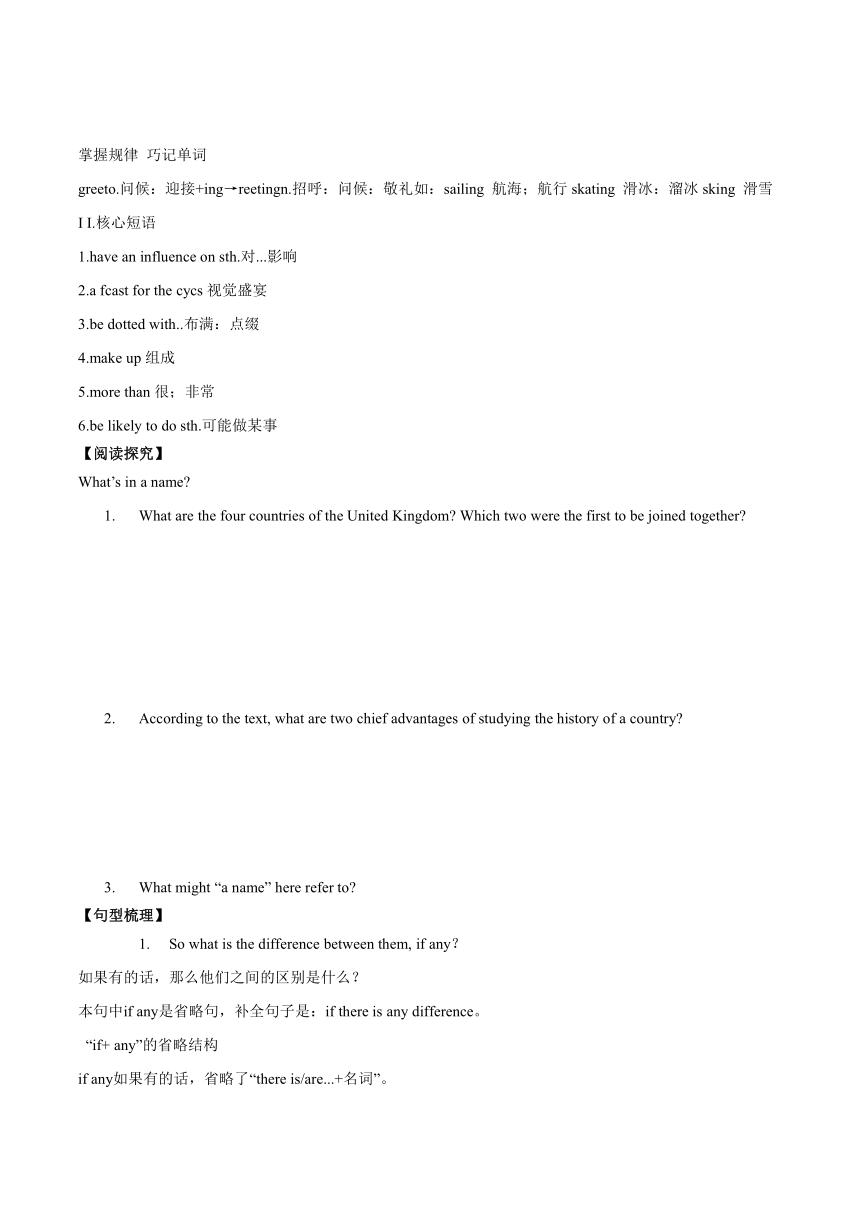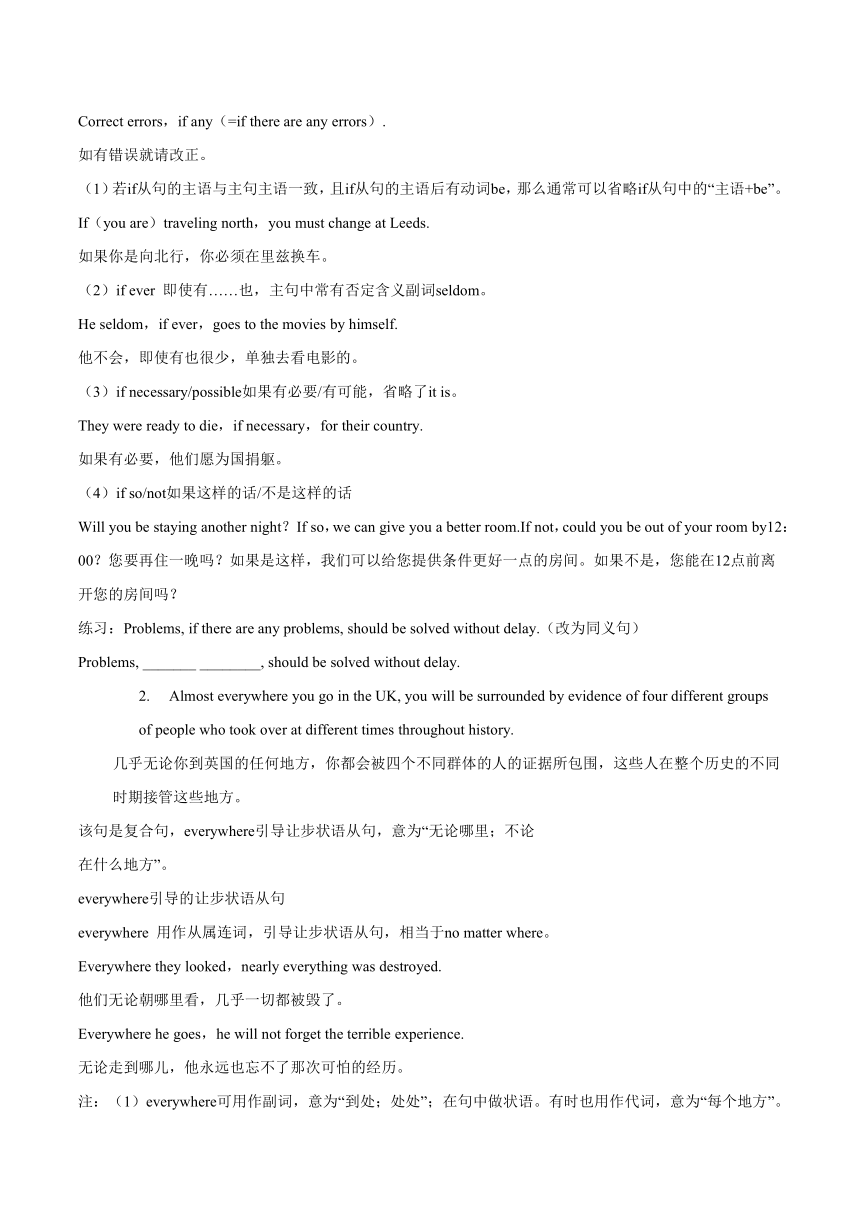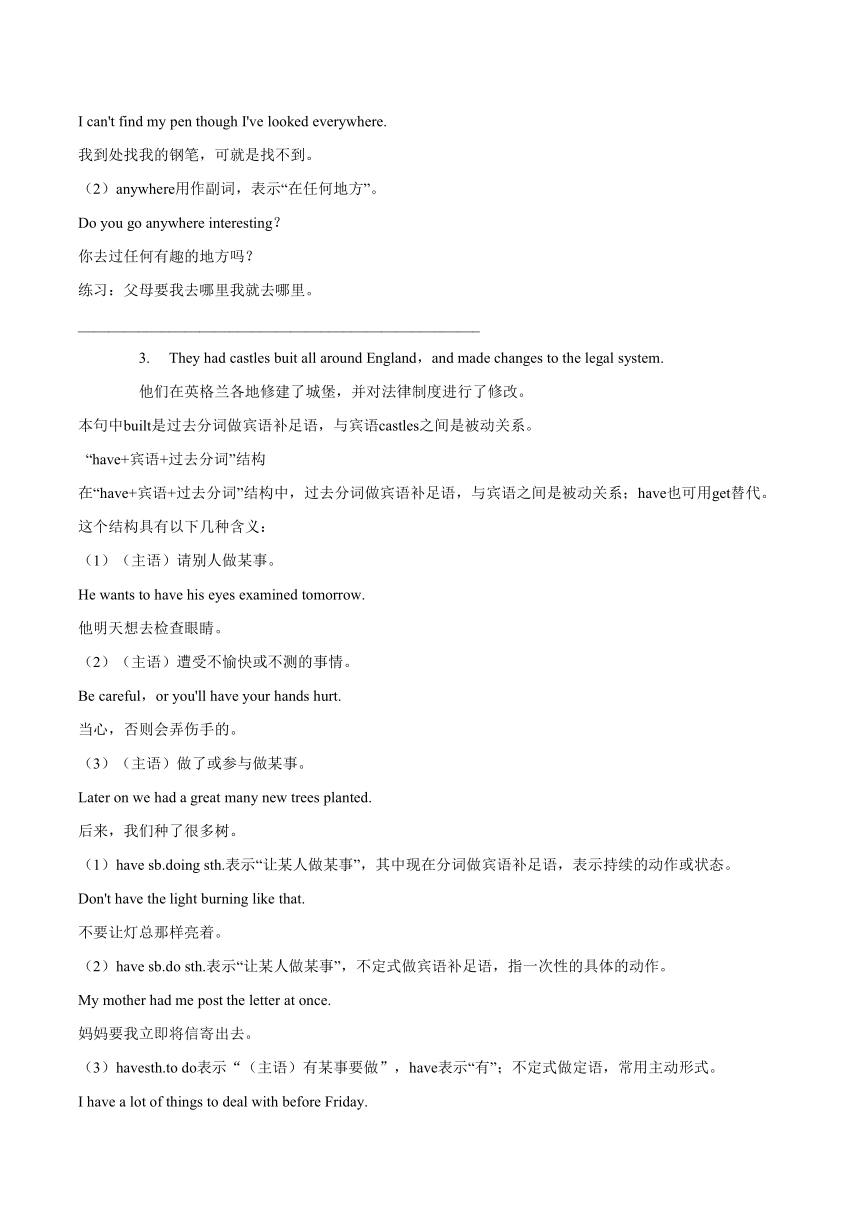人教版(2019)必修 第二册 :Unit4 History And Traditions学案
文档属性
| 名称 | 人教版(2019)必修 第二册 :Unit4 History And Traditions学案 |

|
|
| 格式 | docx | ||
| 文件大小 | 27.6KB | ||
| 资源类型 | 教案 | ||
| 版本资源 | 人教版(2019) | ||
| 科目 | 英语 | ||
| 更新时间 | 2022-01-18 15:04:32 | ||
图片预览




文档简介
高中英语人教版(2019)必修 第二册 Unit 4 History And Traditions学案
【学习目标】
1. Read quickly to get the main idea and learn its history of formation; read carefully to get the detailed information.
2. Learn to use the reading strategy--- reading maps.
3. Guess the new words in a context.
4. Use critical thinking and talk about opinions and views about the UK.
【知识运用】
重点单词
1.courtyardn.庭院;院子
2.snackn.点心;小吃
3.countyn.(英国、爱尔兰的)郡;(美国的)县
4.feastn.盛宴;宴会;节日
5.roll vrt.&vi.(使)翻滚;(使)滚动n.卷(轴);翻滚→olling adj.旋转的;起伏的
6.dotn.点:小(圆)点vt.加点;遍布
7.cattlen.牛
8.roar vi.&n.吼叫;咆哮
9.oceann.大海:海洋
10.sccntn.气味:气息
11.customn.风俗;习俗;习惯
12.cager adj.热切的;渴望的→cagerly ado.热切地;渴望地
13.poctn.诗人→poem n.诗→poetryn.诗歌
14.greet vt.问候;迎接-greetingn.招呼;问候;敬礼
15.sensory adj.感觉的;感官的→senscn.感觉;感觉官能;意识Dt.感到;理解
16.striking adj.吸引人的;显著的;引人注目的一strikevt撞;敲打;攻击;罢工n.攻击;罢工
17.transitionn.过渡:转变→transitv.搬运;运送;转变
18.crowdn.人群:一群人;民众vt.挤满;....拥挤crowded adj.拥挤的
掌握规律 巧记单词
greeto.问候:迎接+ing→reetingn.招呼:问候:敬礼如:sailing 航海;航行skating 滑冰:溜冰sking 滑雪
I I.核心短语
1.have an influence on sth.对...影响
2.a fcast for the cycs视觉盛宴
3.be dotted with..布满:点缀
4.make up组成
5.more than很;非常
6.be likely to do sth.可能做某事
【阅读探究】
What’s in a name
What are the four countries of the United Kingdom Which two were the first to be joined together
According to the text, what are two chief advantages of studying the history of a country
What might “a name” here refer to
【句型梳理】
So what is the difference between them, if any?
如果有的话,那么他们之间的区别是什么?
本句中if any是省略句,补全句子是:if there is any difference。
“if+ any”的省略结构
if any如果有的话,省略了“there is/are...+名词”。
Correct errors,if any(=if there are any errors).
如有错误就请改正。
(1)若if从句的主语与主句主语一致,且if从句的主语后有动词be,那么通常可以省略if从句中的“主语+be”。
If(you are)traveling north,you must change at Leeds.
如果你是向北行,你必须在里兹换车。
(2)if ever 即使有……也,主句中常有否定含义副词seldom。
He seldom,if ever,goes to the movies by himself.
他不会,即使有也很少,单独去看电影的。
(3)if necessary/possible如果有必要/有可能,省略了it is。
They were ready to die,if necessary,for their country.
如果有必要,他们愿为国捐躯。
(4)if so/not如果这样的话/不是这样的话
Will you be staying another night?If so,we can give you a better room.If not,could you be out of your room by12:00?您要再住一晚吗?如果是这样,我们可以给您提供条件更好一点的房间。如果不是,您能在12点前离开您的房间吗?
练习:Problems, if there are any problems, should be solved without delay.(改为同义句)
Problems, _______ ________, should be solved without delay.
Almost everywhere you go in the UK, you will be surrounded by evidence of four different groups of people who took over at different times throughout history.
几乎无论你到英国的任何地方,你都会被四个不同群体的人的证据所包围,这些人在整个历史的不同时期接管这些地方。
该句是复合句,everywhere引导让步状语从句,意为“无论哪里;不论
在什么地方”。
everywhere引导的让步状语从句
everywhere 用作从属连词,引导让步状语从句,相当于no matter where。
Everywhere they looked,nearly everything was destroyed.
他们无论朝哪里看,几乎一切都被毁了。
Everywhere he goes,he will not forget the terrible experience.
无论走到哪儿,他永远也忘不了那次可怕的经历。
注:(1)everywhere可用作副词,意为“到处;处处”;在句中做状语。有时也用作代词,意为“每个地方”。
I can't find my pen though I've looked everywhere.
我到处找我的钢笔,可就是找不到。
(2)anywhere用作副词,表示“在任何地方”。
Do you go anywhere interesting?
你去过任何有趣的地方吗?
练习:父母要我去哪里我就去哪里。
_____________________________________________________
They had castles buit all around England,and made changes to the legal system.
他们在英格兰各地修建了城堡,并对法律制度进行了修改。
本句中built是过去分词做宾语补足语,与宾语castles之间是被动关系。
“have+宾语+过去分词”结构
在“have+宾语+过去分词”结构中,过去分词做宾语补足语,与宾语之间是被动关系;have也可用get替代。这个结构具有以下几种含义:
(1)(主语)请别人做某事。
He wants to have his eyes examined tomorrow.
他明天想去检查眼睛。
(2)(主语)遭受不愉快或不测的事情。
Be careful,or you'll have your hands hurt.
当心,否则会弄伤手的。
(3)(主语)做了或参与做某事。
Later on we had a great many new trees planted.
后来,我们种了很多树。
(1)have sb.doing sth.表示“让某人做某事”,其中现在分词做宾语补足语,表示持续的动作或状态。
Don't have the light burning like that.
不要让灯总那样亮着。
(2)have sb.do sth.表示“让某人做某事”,不定式做宾语补足语,指一次性的具体的动作。
My mother had me post the letter at once.
妈妈要我立即将信寄出去。
(3)havesth.to do表示“(主语)有某事要做”,have表示“有”;不定式做定语,常用主动形式。
I have a lot of things to deal with before Friday.
星期五之前我有很多事情要处理。
练习:I need a new passport so I will have to have my photograph __________(take).
if any
I will go everywhere my parents want me to go.
taken
【语法解析】
过去分词作定语和宾语补足语
过去分词作定语
过去分词作定语,在语态上,表被动;在时间上,表示动作已经发生或完成,与它所修饰的名词有逻辑(意义)上的动宾关系。过去分词作定语时,所修饰的名词在逻辑上相当于被动句中的主语,过去分词相当于谓语。
过去分词作定语表示动作在谓语动作之前发生,已经完成并具有被动意义。有时也不表示时间性。作定语的过去分词一般为及物动词,因为只有及物动词才有被动意义。例如:
He is a teacher loved by his students. 他是个很受学生爱戴的老师。
也有用不及物动词的过去分词作定语的情况,一般作前置定语,它不表示被动意义,只表示主动意义,强调动作完成。不能像及物动词的过去分词那样放在名词后面作定语。例如:
fallen leaves 落叶 retired workers 退休工人 the risen sun 升起的太阳
下面为过去分词作定语的几种情况:
1. 单个的过去分词作定语一般放在被修饰的名词之前。例如:
We needed much more qualified workers. 我们需要更多的合格的工人。
My friend is a returned student. 我的朋友是个归国的留学生。
单个分词也可以作后置定语,用以强调动作。例如:
They decided to change the material used. 他们决定更换使用的材料。
2. 过去分词短语作定语要放在被修饰的名词后面,作后置定语,其作用相当于一个定语从句。
例如:
The student dressed in white is my daughter.
=The student who is dressed in white is my daughter.)穿白色衣服的学生是我的女儿。
3. 如果被修饰的词是由every/some/any/no + thing/body/one所构成的复合代词或指示代词those等时,即使一个单一的分词作形容词用,也要放在被修饰词的后面。例如:
Is there anything unsolved 还有没解决的问题吗?
There is nothing changed here since I left this town.自从我离开这个城镇以来,几乎没
有什么变化。
4. 单个过去分词前加一名词或副词,常用连字符将它们连接起来构成一个复合形容词,放在其修饰的名词前,作前置定语。分词前加的名词表示分词的动作或行为主体,所加的副词表示方式、时间、程度、性质等意义。例如:
This is a state-owned factory. 这是一家国营工厂。 This is our school-run factory. 这是我们的校办工厂。
注意:
①有些过去分词表示特定含义时,单独做定语也放在所修饰的名词之后,如left(剩余的),given(所给的)。
concermed(有关的)等。
There is little time left. Let's hurry up.
剩余的时间不多了,我们赶快吧。
②过去分词修饰代词时,应置于被修饰词之后。
He is one of those invited.
他是那些被邀请的人之一。
③有些过去分词做定语,前置和后置意义不同。试比较:
This is a used car which is worth only 5,000 uan.
这是一辆仅值五千元的旧车。
The method used is very efficient.
所用的这个方法很有效。
④过去分词可做非限制性定语,用来补充说明被修饰词的情况,前面常用逗号与被修饰的成分隔开。
A girl,dressed like a student,came in and sat beside me.
一位学生打扮的女孩走进来,坐在我的旁边。
5.现在分词和过去分词做定语的区别:
过去分词与所修饰的名词之间存在动宾关系,表示一个已完成的动作。现在分词与所修饰的名词之间存在主谓系,它表示一个正在进行的动作。
This is a letter written in black ink.
这是一封用黑墨水写的信。
There are so many people showing interest in surfing the Internet.
过去分词作宾语补足语
过去分词在句子中可作表语、定语、状语、补语(主补、宾补)等。下面就过去分词作宾语补足语的用法作一总结。
1. 能够接过去分词作宾语补足语的情况有:
(1)表示感觉或心理状态的动词。如:see, watch, observe, look at, hear, listen to, feel, notice, think等。
I heard the song sung in English. 我听到有人用英语唱过这首歌。
He found his hometown greatly changed. 他发现他的家乡变化很大。
(2)表示“致使”意义的动词。如:have, make, get, keep, leave等。
I'll have my hair cut tomorrow.明天我要理发。
He got his tooth pulled out yesterday. 他昨天把牙拔了。
Don't leave those things undone.要把那些事情做完。
(3)表示“希望”、“要求”意义的动词。如:like, order, want, wish等。
I would like this matter settled at once. 我希望此事立刻得到解决。
I wish my homework finished before five o'clock. 我希望5点前完成我的作业。
(4)在“wih+宾语+过去分词”结构中,过去分词用作with的宾语补足语,过去分词与宾语之间为动宾关系。结构通常在句中做时间、方式、条件、原因等状语。
She usually works in her study with the door locked.
她通常锁着门在书房工作。
The murderer was brought in,with his hands tied behind.凶手被带进来了,他的双手被绑在背后。
2. 过去分词做宾语补足语与其他非谓语动词做宾语补足语的区别:
(1)及物动词的过去分词做宾语补足语时,表被动,说明宾语是过去分词动作的承受者;不及物动词的过去分词做宾语补足语时,表动作的完成,说明分词的动作发生在谓语动词之前。
We have our classroom cleaned after school every day.
每天放学后我们把教室打扫干净。(classroom与clean之间为逻辑上的被动关系)
We have our classroom cleaned after school every day.
每天放学后我们把教室打扫干净。(classrom与clean之间为逻辑上的被动关系)
When I got home,I found my wallet gone.
当我回到家,我发现我的钱包丢了。(“丢”这一动作已经完成)
(2)用现在分词做宾语补足语,表示动作正在进行且与宾语构成主谓关系。
When I came here,I saw Li Lei reading an English book.
当我来到这儿,我看到李蕾正在读一本英文书。(“读书”这一动作正在进行)
(3)不定式做宾语补足语时,一般表示不定式的动作在谓语动词之后发生,但动词 feel,see,hear,watch,notice,observe后的不定式做宾语补足语时(不定式的to须省略)表示不定式动作的全过程。
The teacher will have Li Lei clean the classroom today.
今天老师将让李蕾打扫教室。(Li Lei与clean之间为逻辑上的主动关系,clean 这一动作发生在have之后)
I heard Wei Fang sing this song.
我听到魏芳唱了这首歌。(“我”听见了“唱”的整个过程)
【巩固练习】
1.He sounded both pitiful and eager _____ (get) what he wanted.
2.Even a small success gives us a sense of _____ (成就).
3.The first thing he looked at was his office's _____ (位置).
4.We should not focus on how to fight each other but how to prevent _____ (军事的) action.
5.The town walls were built as a _____ (防御) against enemy attacks.
6._____ (围绕;包围) yourself with good people who love you and inspire you.
7.Experts have found a lot of _____ (证据) that stress is partly responsible for disease.
8.What the company has done is perfectly _____ (合法的).
9.At a _____ (附近的) table, a man was complaining in a loud voice.
10.Industry and opportunity were the _____ (最重要的) factors in his success.
参考答案
1.答案:to get
解析:
2.答案:achievement
解析:
3.答案:location
解析:
4.答案:military
解析:
5.答案:defence
解析:
6.答案:Surround
解析:
7.答案:evidence
解析:
8.答案:legal
解析:
9.答案:nearby
解析:
10.答案:chief
解析:
【学习目标】
1. Read quickly to get the main idea and learn its history of formation; read carefully to get the detailed information.
2. Learn to use the reading strategy--- reading maps.
3. Guess the new words in a context.
4. Use critical thinking and talk about opinions and views about the UK.
【知识运用】
重点单词
1.courtyardn.庭院;院子
2.snackn.点心;小吃
3.countyn.(英国、爱尔兰的)郡;(美国的)县
4.feastn.盛宴;宴会;节日
5.roll vrt.&vi.(使)翻滚;(使)滚动n.卷(轴);翻滚→olling adj.旋转的;起伏的
6.dotn.点:小(圆)点vt.加点;遍布
7.cattlen.牛
8.roar vi.&n.吼叫;咆哮
9.oceann.大海:海洋
10.sccntn.气味:气息
11.customn.风俗;习俗;习惯
12.cager adj.热切的;渴望的→cagerly ado.热切地;渴望地
13.poctn.诗人→poem n.诗→poetryn.诗歌
14.greet vt.问候;迎接-greetingn.招呼;问候;敬礼
15.sensory adj.感觉的;感官的→senscn.感觉;感觉官能;意识Dt.感到;理解
16.striking adj.吸引人的;显著的;引人注目的一strikevt撞;敲打;攻击;罢工n.攻击;罢工
17.transitionn.过渡:转变→transitv.搬运;运送;转变
18.crowdn.人群:一群人;民众vt.挤满;....拥挤crowded adj.拥挤的
掌握规律 巧记单词
greeto.问候:迎接+ing→reetingn.招呼:问候:敬礼如:sailing 航海;航行skating 滑冰:溜冰sking 滑雪
I I.核心短语
1.have an influence on sth.对...影响
2.a fcast for the cycs视觉盛宴
3.be dotted with..布满:点缀
4.make up组成
5.more than很;非常
6.be likely to do sth.可能做某事
【阅读探究】
What’s in a name
What are the four countries of the United Kingdom Which two were the first to be joined together
According to the text, what are two chief advantages of studying the history of a country
What might “a name” here refer to
【句型梳理】
So what is the difference between them, if any?
如果有的话,那么他们之间的区别是什么?
本句中if any是省略句,补全句子是:if there is any difference。
“if+ any”的省略结构
if any如果有的话,省略了“there is/are...+名词”。
Correct errors,if any(=if there are any errors).
如有错误就请改正。
(1)若if从句的主语与主句主语一致,且if从句的主语后有动词be,那么通常可以省略if从句中的“主语+be”。
If(you are)traveling north,you must change at Leeds.
如果你是向北行,你必须在里兹换车。
(2)if ever 即使有……也,主句中常有否定含义副词seldom。
He seldom,if ever,goes to the movies by himself.
他不会,即使有也很少,单独去看电影的。
(3)if necessary/possible如果有必要/有可能,省略了it is。
They were ready to die,if necessary,for their country.
如果有必要,他们愿为国捐躯。
(4)if so/not如果这样的话/不是这样的话
Will you be staying another night?If so,we can give you a better room.If not,could you be out of your room by12:00?您要再住一晚吗?如果是这样,我们可以给您提供条件更好一点的房间。如果不是,您能在12点前离开您的房间吗?
练习:Problems, if there are any problems, should be solved without delay.(改为同义句)
Problems, _______ ________, should be solved without delay.
Almost everywhere you go in the UK, you will be surrounded by evidence of four different groups of people who took over at different times throughout history.
几乎无论你到英国的任何地方,你都会被四个不同群体的人的证据所包围,这些人在整个历史的不同时期接管这些地方。
该句是复合句,everywhere引导让步状语从句,意为“无论哪里;不论
在什么地方”。
everywhere引导的让步状语从句
everywhere 用作从属连词,引导让步状语从句,相当于no matter where。
Everywhere they looked,nearly everything was destroyed.
他们无论朝哪里看,几乎一切都被毁了。
Everywhere he goes,he will not forget the terrible experience.
无论走到哪儿,他永远也忘不了那次可怕的经历。
注:(1)everywhere可用作副词,意为“到处;处处”;在句中做状语。有时也用作代词,意为“每个地方”。
I can't find my pen though I've looked everywhere.
我到处找我的钢笔,可就是找不到。
(2)anywhere用作副词,表示“在任何地方”。
Do you go anywhere interesting?
你去过任何有趣的地方吗?
练习:父母要我去哪里我就去哪里。
_____________________________________________________
They had castles buit all around England,and made changes to the legal system.
他们在英格兰各地修建了城堡,并对法律制度进行了修改。
本句中built是过去分词做宾语补足语,与宾语castles之间是被动关系。
“have+宾语+过去分词”结构
在“have+宾语+过去分词”结构中,过去分词做宾语补足语,与宾语之间是被动关系;have也可用get替代。这个结构具有以下几种含义:
(1)(主语)请别人做某事。
He wants to have his eyes examined tomorrow.
他明天想去检查眼睛。
(2)(主语)遭受不愉快或不测的事情。
Be careful,or you'll have your hands hurt.
当心,否则会弄伤手的。
(3)(主语)做了或参与做某事。
Later on we had a great many new trees planted.
后来,我们种了很多树。
(1)have sb.doing sth.表示“让某人做某事”,其中现在分词做宾语补足语,表示持续的动作或状态。
Don't have the light burning like that.
不要让灯总那样亮着。
(2)have sb.do sth.表示“让某人做某事”,不定式做宾语补足语,指一次性的具体的动作。
My mother had me post the letter at once.
妈妈要我立即将信寄出去。
(3)havesth.to do表示“(主语)有某事要做”,have表示“有”;不定式做定语,常用主动形式。
I have a lot of things to deal with before Friday.
星期五之前我有很多事情要处理。
练习:I need a new passport so I will have to have my photograph __________(take).
if any
I will go everywhere my parents want me to go.
taken
【语法解析】
过去分词作定语和宾语补足语
过去分词作定语
过去分词作定语,在语态上,表被动;在时间上,表示动作已经发生或完成,与它所修饰的名词有逻辑(意义)上的动宾关系。过去分词作定语时,所修饰的名词在逻辑上相当于被动句中的主语,过去分词相当于谓语。
过去分词作定语表示动作在谓语动作之前发生,已经完成并具有被动意义。有时也不表示时间性。作定语的过去分词一般为及物动词,因为只有及物动词才有被动意义。例如:
He is a teacher loved by his students. 他是个很受学生爱戴的老师。
也有用不及物动词的过去分词作定语的情况,一般作前置定语,它不表示被动意义,只表示主动意义,强调动作完成。不能像及物动词的过去分词那样放在名词后面作定语。例如:
fallen leaves 落叶 retired workers 退休工人 the risen sun 升起的太阳
下面为过去分词作定语的几种情况:
1. 单个的过去分词作定语一般放在被修饰的名词之前。例如:
We needed much more qualified workers. 我们需要更多的合格的工人。
My friend is a returned student. 我的朋友是个归国的留学生。
单个分词也可以作后置定语,用以强调动作。例如:
They decided to change the material used. 他们决定更换使用的材料。
2. 过去分词短语作定语要放在被修饰的名词后面,作后置定语,其作用相当于一个定语从句。
例如:
The student dressed in white is my daughter.
=The student who is dressed in white is my daughter.)穿白色衣服的学生是我的女儿。
3. 如果被修饰的词是由every/some/any/no + thing/body/one所构成的复合代词或指示代词those等时,即使一个单一的分词作形容词用,也要放在被修饰词的后面。例如:
Is there anything unsolved 还有没解决的问题吗?
There is nothing changed here since I left this town.自从我离开这个城镇以来,几乎没
有什么变化。
4. 单个过去分词前加一名词或副词,常用连字符将它们连接起来构成一个复合形容词,放在其修饰的名词前,作前置定语。分词前加的名词表示分词的动作或行为主体,所加的副词表示方式、时间、程度、性质等意义。例如:
This is a state-owned factory. 这是一家国营工厂。 This is our school-run factory. 这是我们的校办工厂。
注意:
①有些过去分词表示特定含义时,单独做定语也放在所修饰的名词之后,如left(剩余的),given(所给的)。
concermed(有关的)等。
There is little time left. Let's hurry up.
剩余的时间不多了,我们赶快吧。
②过去分词修饰代词时,应置于被修饰词之后。
He is one of those invited.
他是那些被邀请的人之一。
③有些过去分词做定语,前置和后置意义不同。试比较:
This is a used car which is worth only 5,000 uan.
这是一辆仅值五千元的旧车。
The method used is very efficient.
所用的这个方法很有效。
④过去分词可做非限制性定语,用来补充说明被修饰词的情况,前面常用逗号与被修饰的成分隔开。
A girl,dressed like a student,came in and sat beside me.
一位学生打扮的女孩走进来,坐在我的旁边。
5.现在分词和过去分词做定语的区别:
过去分词与所修饰的名词之间存在动宾关系,表示一个已完成的动作。现在分词与所修饰的名词之间存在主谓系,它表示一个正在进行的动作。
This is a letter written in black ink.
这是一封用黑墨水写的信。
There are so many people showing interest in surfing the Internet.
过去分词作宾语补足语
过去分词在句子中可作表语、定语、状语、补语(主补、宾补)等。下面就过去分词作宾语补足语的用法作一总结。
1. 能够接过去分词作宾语补足语的情况有:
(1)表示感觉或心理状态的动词。如:see, watch, observe, look at, hear, listen to, feel, notice, think等。
I heard the song sung in English. 我听到有人用英语唱过这首歌。
He found his hometown greatly changed. 他发现他的家乡变化很大。
(2)表示“致使”意义的动词。如:have, make, get, keep, leave等。
I'll have my hair cut tomorrow.明天我要理发。
He got his tooth pulled out yesterday. 他昨天把牙拔了。
Don't leave those things undone.要把那些事情做完。
(3)表示“希望”、“要求”意义的动词。如:like, order, want, wish等。
I would like this matter settled at once. 我希望此事立刻得到解决。
I wish my homework finished before five o'clock. 我希望5点前完成我的作业。
(4)在“wih+宾语+过去分词”结构中,过去分词用作with的宾语补足语,过去分词与宾语之间为动宾关系。结构通常在句中做时间、方式、条件、原因等状语。
She usually works in her study with the door locked.
她通常锁着门在书房工作。
The murderer was brought in,with his hands tied behind.凶手被带进来了,他的双手被绑在背后。
2. 过去分词做宾语补足语与其他非谓语动词做宾语补足语的区别:
(1)及物动词的过去分词做宾语补足语时,表被动,说明宾语是过去分词动作的承受者;不及物动词的过去分词做宾语补足语时,表动作的完成,说明分词的动作发生在谓语动词之前。
We have our classroom cleaned after school every day.
每天放学后我们把教室打扫干净。(classroom与clean之间为逻辑上的被动关系)
We have our classroom cleaned after school every day.
每天放学后我们把教室打扫干净。(classrom与clean之间为逻辑上的被动关系)
When I got home,I found my wallet gone.
当我回到家,我发现我的钱包丢了。(“丢”这一动作已经完成)
(2)用现在分词做宾语补足语,表示动作正在进行且与宾语构成主谓关系。
When I came here,I saw Li Lei reading an English book.
当我来到这儿,我看到李蕾正在读一本英文书。(“读书”这一动作正在进行)
(3)不定式做宾语补足语时,一般表示不定式的动作在谓语动词之后发生,但动词 feel,see,hear,watch,notice,observe后的不定式做宾语补足语时(不定式的to须省略)表示不定式动作的全过程。
The teacher will have Li Lei clean the classroom today.
今天老师将让李蕾打扫教室。(Li Lei与clean之间为逻辑上的主动关系,clean 这一动作发生在have之后)
I heard Wei Fang sing this song.
我听到魏芳唱了这首歌。(“我”听见了“唱”的整个过程)
【巩固练习】
1.He sounded both pitiful and eager _____ (get) what he wanted.
2.Even a small success gives us a sense of _____ (成就).
3.The first thing he looked at was his office's _____ (位置).
4.We should not focus on how to fight each other but how to prevent _____ (军事的) action.
5.The town walls were built as a _____ (防御) against enemy attacks.
6._____ (围绕;包围) yourself with good people who love you and inspire you.
7.Experts have found a lot of _____ (证据) that stress is partly responsible for disease.
8.What the company has done is perfectly _____ (合法的).
9.At a _____ (附近的) table, a man was complaining in a loud voice.
10.Industry and opportunity were the _____ (最重要的) factors in his success.
参考答案
1.答案:to get
解析:
2.答案:achievement
解析:
3.答案:location
解析:
4.答案:military
解析:
5.答案:defence
解析:
6.答案:Surround
解析:
7.答案:evidence
解析:
8.答案:legal
解析:
9.答案:nearby
解析:
10.答案:chief
解析:
